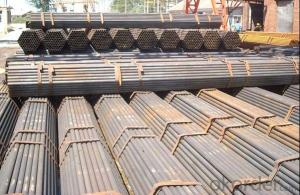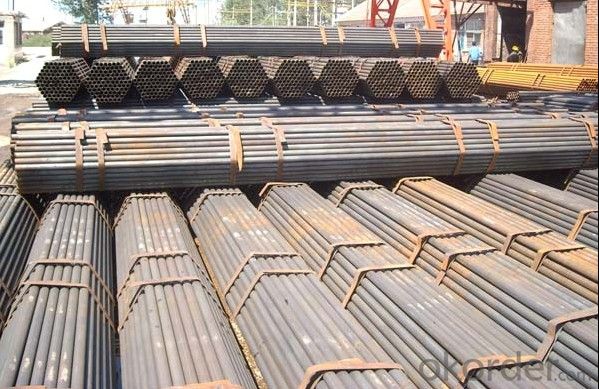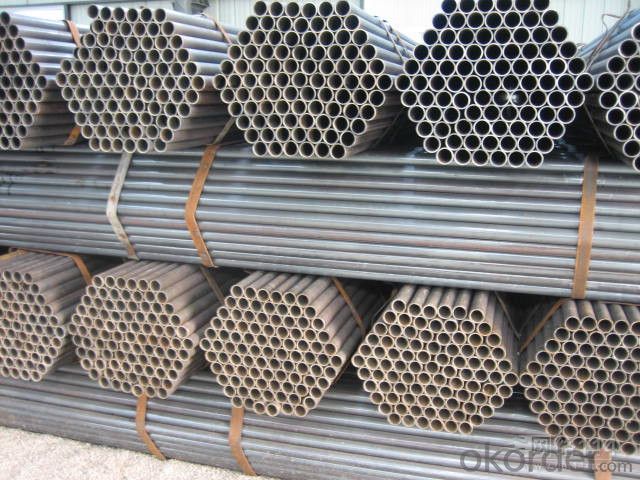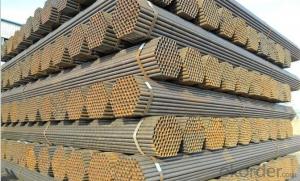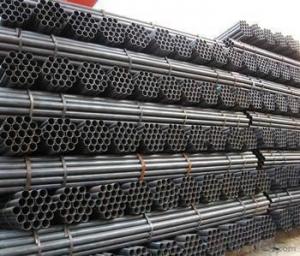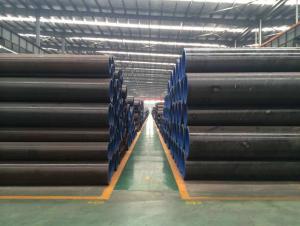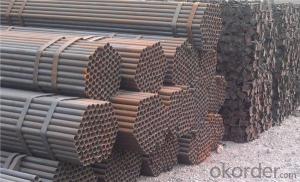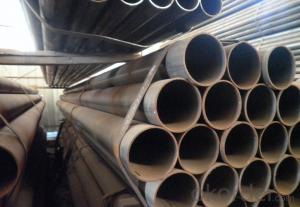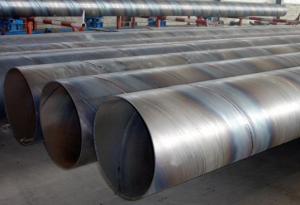Welded Black ERW Steel Pipe ISO Standard
- Loading Port:
- Tianjin
- Payment Terms:
- TT OR LC
- Min Order Qty:
- 30 m.t.
- Supply Capability:
- 5000 m.t./month
OKorder Service Pledge
OKorder Financial Service
You Might Also Like
1、Structure of Welded Black ERW Pipe ISO Standard:
Welded Black ERW Steel Pipe ISO Standard is electric resistance welding, the abbreviation for ERW for transporting oil and natural gas vapor liquid objects, can meet the requirements of high and low pressure, the transport in the world with pipe sector accounted for a pivotal position.With sound reputation and high quality , we will offer clients a wonderful business experience.
2、Main Features of Welded Black ERW Pipe ISO Standard:
• High manufacturing accuracy
• High strength
• Good visual effect
• Good view and appearance
• Good shape
• Reasonable price
• Small inertia resistance
• Strong heat dissipation ability
3、Welded Black ERW Steel Pipe ISO Standard Specification:
Standard | GB, DIN, ASTM ASTM A106-2006, ASTM A53-2007 |
Grade | 10#-45#, 16Mn 10#, 20#, 45#, 16Mn |
Thickness | 1 - 33 mm |
Section Shape | Round |
Outer Diameter | 21 - 610mm |
Place of Origin | Tianjin, China (Mainland) |
Secondary Or Not | Non-secondary |
Application | Hydraulic Pipe |
Technique | Cold Drawn |
Certification | API |
Surface Treatment | factory state or painted black |
Special Pipe | API Pipe |
Alloy Or Not | Non-alloy |
Length | 5-12M |
Outer Diameter | 21.3-610mm |
Grade | 20#, 45#, Q345, API J55, API K55, API L80, API N80, API P110, A53B |
Standard | ASME, ASTM |
1) Material:20#(ASTM A 106/A53 GRB.API5LGRB,GB),45#,16Mn,10#.
2) Specification range:OD:21.3-610mm,WT:6-70mm,length:6-12m or according to the requirement of clients.
3) Excutive standards:GB,ASME API5L.ASTM A 106/A53,Despite of the above standards,we can also supply seamless steel pipe with standard of DIN,JIS,and so on,and also develop new products according to the requirements of our clients!
4) Surface:black lacquered,varnish coating or galvanized.
5) Ends:Beveled or square cut,plastic capped,painted.
6) Packing:bundles wrapped with strong steel strip,seaworthy packing.
4、Packaging & Delivery
Packaging Details: | seaworthy package,bundles wrapped with strong steel strip |
Delivery Detail: | 15-30days after received 30%TT |
5、FAQ of Welded Black ERW Pipe ISO Standard:
①How is the quality of your products?
Our products are manufactured strictly according to national and internaional standard, and we take a test
on every pipe before delivered out. If you want see our quality certifications and all kinds of testing report, please just ask us for it.
Guaranteed: If products’ quality don’t accord to discription as we give or the promise before you place order, we promise 100% refund.
②How about price?
Yes, we are factory and be able to give you lowest price below market one, and we have a policy that “ for saving time and absolutely honest business attitude, we quote as lowest as possible for any customer, and discount can be given according to quantity”,if you like bargain and factory price is not low enough as you think, just don’t waste your time.Please trust the quotation we would give you, it is professional one.
③Why should you chose us?
Chose happens because of quality, then price, We can give you both.Additionally, we can also offer professional products inquiry, products knowledge train(for agents), smooth goods delivery, exellent customer solution proposals.Our service formula: good quality+good price+good service=customer’s trust
SGS test is available, customer inspection before shipping is welcome, third party inspection is no problem.
6、 Welded Black ERW Pipe ISO Standard Images:
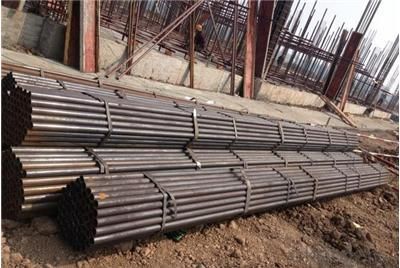
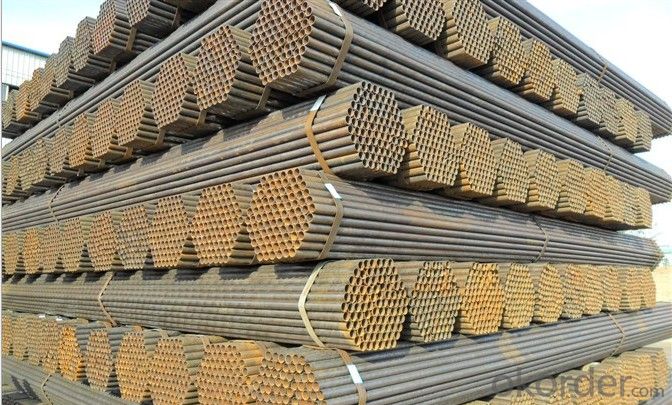
- Q: What are the different types of steel pipe coatings for marine applications?
- There are several types of steel pipe coatings used for marine applications, including fusion-bonded epoxy (FBE) coatings, three-layer polyethylene (3LPE) coatings, three-layer polypropylene (3LPP) coatings, and concrete weight coatings (CWC). These coatings provide protection against corrosion, abrasion, and other environmental factors, ensuring the longevity and durability of the steel pipes in marine environments.
- Q: What is the compressive strength of steel pipes?
- The compressive strength of steel pipes can vary depending on the specific grade and manufacturing process, but it is generally high. On average, steel pipes have a compressive strength ranging from 60,000 to 120,000 pounds per square inch (psi).
- Q: What is a valve and how is it used in steel pipes?
- A valve is a device that controls the flow of fluid or gas by opening, closing, or partially obstructing passageways within a pipeline system. In the context of steel pipes, valves are used to regulate the flow of liquid or gas through the pipe network, allowing for control over the volume, pressure, and direction of the fluid. This ensures efficient and safe operation of the steel pipes by preventing excessive flow, leakage, or backflow. Additionally, valves in steel pipes enable the isolation and maintenance of specific sections of the pipeline without interrupting the entire system.
- Q: What is an electric welded pipe (EFW)? Seek help!
- Pipe and pipe fittings should be suitable for the gap, usually with micro force insertion is appropriate, the gap is too large or too small will affect the quality of the interface.Check the depth of the plug and slip the spigot into the socket and position correctly.
- Q: What are the different methods of bending steel pipes?
- There are several methods of bending steel pipes, including manual bending, rotary draw bending, mandrel bending, and hydraulic pipe bending.
- Q: What is the difference between steel pipes and copper pipes?
- The main difference between steel pipes and copper pipes lies in their material composition. Steel pipes are made of iron and carbon, while copper pipes are composed of copper metal. Additionally, steel pipes are generally more durable and can withstand higher pressure and temperature levels, making them suitable for industrial applications. On the other hand, copper pipes are more malleable and easily bent, making them ideal for residential plumbing systems. Moreover, copper pipes have better corrosion resistance compared to steel pipes, which may require coatings or treatments to prevent rusting.
- Q: What are the different sizes available for steel pipes?
- Steel pipes are available in a wide range of sizes, ranging from small diameter pipes typically used for plumbing purposes, to large diameter pipes used in industrial applications. These sizes can vary significantly depending on the specific requirements and intended use of the pipe, but common sizes include 1/2 inch, 3/4 inch, 1 inch, 2 inch, 4 inch, 6 inch, 8 inch, and 10 inch, among others.
- Q: How do steel pipes handle thermal expansion?
- Steel pipes handle thermal expansion by expanding and contracting along their length due to changes in temperature. This expansion is accommodated by allowing the pipes to move freely or by using expansion joints, which can absorb the thermal expansion and prevent damage or failure.
- Q: Can steel pipes be used for underground drainage?
- Yes, steel pipes can be used for underground drainage. Steel pipes are commonly used for underground drainage systems due to their durability, strength, and resistance to various elements, such as soil erosion, chemical corrosion, and high pressure. However, it is important to consider factors like the type of soil, environmental conditions, and the specific requirements of the drainage system before deciding on the material for underground drainage pipes.
- Q: How are steel pipes made?
- Steel pipes are made through a process called pipe manufacturing, which involves multiple steps. Firstly, raw steel is melted in a furnace and then subjected to continuous casting to form a solid billet. This billet is then heated and pierced to create a hollow tube called a shell. Next, the shell is rolled and stretched to the desired diameter and thickness using a series of rollers. The pipe is then subjected to a process called welding, where two edges of the shell are fused together to create a seamless or welded pipe. Finally, the pipe undergoes various finishing processes such as cutting, straightening, and inspection before being ready for use.
Send your message to us
Welded Black ERW Steel Pipe ISO Standard
- Loading Port:
- Tianjin
- Payment Terms:
- TT OR LC
- Min Order Qty:
- 30 m.t.
- Supply Capability:
- 5000 m.t./month
OKorder Service Pledge
OKorder Financial Service
Similar products
Hot products
Hot Searches
Related keywords
